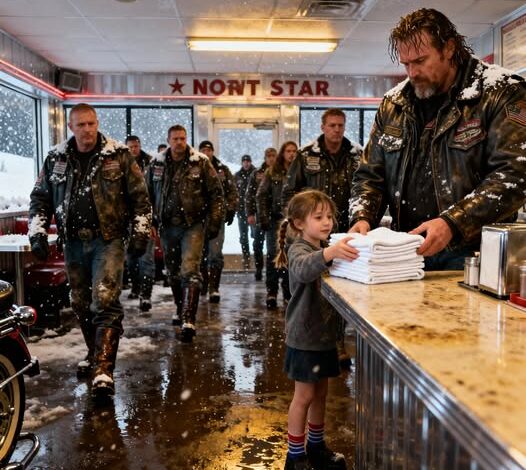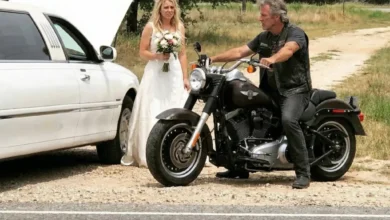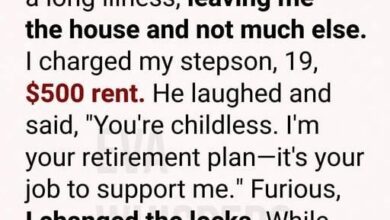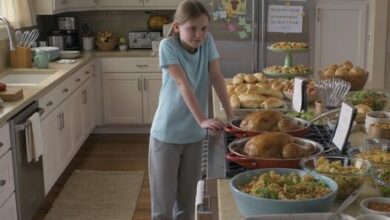
In a diner lost to a raging storm, a quiet veteran poured coffee, his last seven days ticking away. Then, the engines growled. Fifteen strangers walked in, but they already knew the man who had spent a lifetime erasing his own name from history.
The storm came down on the Rockies with no mercy, a wall of white pounding the windows of the North Star diner like a thousand tiny fists. Outside, the highway had vanished. The world had gone dark, leaving just this one small rectangle of golden light, a final glowing ember against the mountain’s rage.
Inside, the booths were empty. A man with shoulders broad enough to have carried two wars leaned against the counter, wiping a spotless patch of formica for the third time. Martin Greavves wore a faded white apron over a life he didn’t talk about. In his pocket, crisp and heavy as a stone, was the letter from the bank. Seven days. Seven days until the diner, the only thing still tethering him to the world, would be stripped away.
“Daddy?”
The soft voice cut through the howl of the wind. Nine-year-old Ellie peeked out from the kitchen, her hair in two uneven braids, a sketchbook clutched in her hands. Her eyes were too knowing for a child her age.
“You should be asleep, bug,” Martin said, managing a half-smile that didn’t quite reach his eyes.
“Couldn’t,” she said, padding toward him in her socks. “The wind sounds angry.” She climbed onto a stool and showed him her drawing: the diner’s lights blazing like a beacon against a swirl of dark, furious crayon. He touched the page gently, his throat tight.
“That’s why we keep it open,” he whispered. “If anyone’s out there, lost or tired, they’ll see the light.”
Just then, a sound that didn’t belong cut through the storm. A low, guttural growl, steady and unrelenting. Headlights sliced through the snow—not one, but fifteen beams, swaying like restless spirits.
“Daddy, do you hear that?” Ellie gasped.
Martin’s heart thudded. He knew that sound. Harley-Davidsons. The engines snarled as they pulled up, chrome and steel glistening under layers of snow. The bell over the door jingled, and one by one, fifteen bikers filed in. They were shadows carved from leather and road grime, their faces hard, their silence heavier than the storm itself.
Martin didn’t flinch. He poured coffee into a mug and slid it across the counter. His daughter, small but brave, climbed down from her stool and carried a stack of clean towels to the men, her smile unwavering.
For a moment, the only sounds were the hiss of the coffee machine and the creak of wet boots on linoleum. Then, a younger biker with a pale face stepped forward, his lips trembling.
“It’s you,” he whispered, his voice cracking with a mix of shock and awe. “It’s really you.”
The diner seemed to hold its breath. Martin met the boy’s eyes but said nothing. He just picked up another mug, poured, and slid it across. No greetings, no explanations—just warmth in a world frozen over. Ellie, on her tiptoes, handed a towel to the trembling young man. He stared at her, then at Martin, as if unable to comprehend how this quiet diner could hold so much gravity.
They hadn’t come here by chance. The storm had pushed them, yes. But something older, something unspoken, had led them back to the man who had once carried them through their darkest nights. Martin Greavves, the silent veteran with a diner that refused to close, was no stranger to storms. And tonight, the storm had brought his ghosts to the door.
As the night wore on, the stories began to emerge—broken fragments of nights when they had been alone, desperate, and saved by a stranger who never gave his name.
“Two years ago,” the young biker began, his voice unsteady. “Route 89, middle of winter. Bike broke down. I was ready to just… let the snow take me.” His eyes glistened. “Then a truck stopped. An old guy. He didn’t ask my name. Just fed me, left me at this diner. That was you, wasn’t it?”
Martin’s silence was answer enough.
“Name’s Tucker McKeen,” the young man said. “They call me Dust. I… I never knew how to thank you.”
A tall man at the counter spoke next, his voice gravelly. “Winter of ’08. Leg was bleeding bad. Someone kept pressure on the wound, got me to a med truck. Just left. That was you, too, wasn’t it?”
Martin’s jaw flexed, but he kept his gaze on the coffee pot.
Then, from near the door, a woman’s voice cut through, sharp but trembling. Raven Calder, known on the road as Knox, had eyes that carried shadows deeper than the storm. “You saved me,” she said simply. “Years ago, after the crash. I never saw your face. But I remember the hands. Steady. Gentle.”
Ellie, perched on her stool, whispered, “Daddy’s hands are always like that.”
The bikers exchanged glances, but no one dared to laugh. The child’s innocence seemed to soften the hardest faces in the room.
Finally, Martin spoke, his voice low and raspy. “This is a place for warmth,” he said. “Not for stories.”
The bikers stilled, understanding. They didn’t need his stories; they carried enough of their own. All they needed tonight was a place where the light still burned. As the snow piled higher, 15 souls sat in silence, nursing hot coffee and staring at the man who had once pulled them from the shadows.
Morning brought no relief. The world outside was a white void. But inside, the stories continued, weaving a history Martin had tried to bury.
“Iraq, ’05,” another biker muttered. “Pinned down, bleeding out. Somebody kept pressure on the wound till the Medevac came. Never gave his name.” His eyes flicked to Martin, who was wiping down a table with maddening calm.
Jack Monroe, broad-shouldered and scarred, had been quiet all night. Now, he stood. “Kandahar,” he said, the name landing like a thunderclap. “Our unit was ambushed. There was one soldier… never said a word, not once. Carried two of us out under fire. Took a bullet himself and kept moving. We called him ‘The Silent One.’” He stepped forward, his boots heavy on the tile. “I never knew his name. But now I see him standing in front of me, serving coffee like none of it ever happened.”
The room seemed to shrink. Ellie tugged at her father’s apron. “Daddy, why didn’t you ever tell me?”
He crouched beside her, his eyes tired but gentle. “Because, bug,” he said softly, “it’s not about telling. It’s about doing.”
Later, in the quiet hours before dawn, Raven found Ellie in the kitchen, hunched over her sketchbook. The little girl showed her a drawing of Raven on her Harley, her eyes fierce but kind.
“Why me?” Raven asked.
“Because you looked lonely,” Ellie said simply. “And when people look lonely, I like to draw them happy.”
The words cracked something open in Raven. Her gaze fell on a faded handkerchief folded on the counter. She picked it up. Stitched in uneven thread were the words: To those we couldn’t save.
Her breath caught. The night of her crash, the soldier who saved her had pressed that same cloth against her back. All these years, she thought she’d survived by chance. But the truth was right here, in this diner, wearing an apron.
At 9:12 a.m., the bell rang again. A woman in a tailored wool coat swept in, her heels clicking on the floor. Darla Voss, the regional bank director.
“Mr. Greavves,” she said crisply. “You received the notice. The foreclosure will proceed.” She slid a folder onto the counter. “Sign this. An early surrender. A casino group is interested in the land. This diner, charming as it is, sits on property far more valuable than pancakes and coffee.”
Dust slammed his mug down. “You think you can just erase this place?”
The room bristled, but Martin lifted a hand. “No,” he said, his voice calm. “We don’t fight with fists. Not here.” He looked at Darla, his expression unwavering. “This place isn’t for sale. North Star stays open until the light goes out on its own.”
“You have seven days,” she said coldly, and strode back into the storm.
Silence fell. “Daddy, what if she takes the diner?” Ellie whispered.
Martin met her worried eyes. “Then we do what we always do, bug. We keep the light on as long as we can.”
But it was no longer just Martin’s fight.
The bikers made their calls. By the next morning, the diner began to vibrate. First a hum, then a rumble, then a thunder made of chrome and steel. From the valley below, headlights pierced the gray dawn. One Harley, then ten, then fifty. An unbroken line of riders pushed through the snow, their patches marking chapters from across the country. Wyoming, Utah, Arizona, Texas.
By the time the last rider crested the hill, the count was 102. One hundred and two debts being repaid, unasked but freely given.
They spilled into the diner, a chorus of gratitude. But it was Dust who stood at the center of the room. “We all owe him,” he said, his voice shaking. “If this light goes out, part of us does, too.”
Wallets came out. Bills slapped onto tables—crumpled fives, rolled stacks, fresh twenties. When it was counted, the total was $86,200.
Then an architect stepped forward, unfolding blueprints. “An expanded diner,” he said. “Bunk rooms for travelers, a play space, a small counseling office marked ‘Healing Room.’ It’s a stop for anyone carrying weight too heavy for the road.”
Pledges were made. Vows were sealed. Each chapter would ride back, once a year, to keep the place alive.
In the midst of the celebration, Darla Voss returned, her face a mask of cold resolve. But a biker named Miles stopped her, pressing a folded letter into her hand. “You dropped this,” he said.
Confused, she read it. The handwriting was her son’s, the one she’d lost years ago.
Mom, if you find this, it means I couldn’t fight anymore. But before I left, I met a man, a cook at some diner. He looked me in the eye like I mattered. For a moment, I felt seen. Tell him thank you.
A sob broke from her. The woman who had come to destroy the diner now sat undone by the truth: Martin had been there for her boy when she couldn’t be.
Slowly, with trembling hands, she took the foreclosure papers from her bag and tore them down the middle. Then again, and again.
“The bank won’t take this place,” she said, her voice ragged. “Consider this debt forgiven.”
A roar erupted. Ellie ran to her father, hugging his waist with all her might. For the first time, Martin Greavves closed his eyes and let himself feel relief.
Six months later, spring had bloomed in the Rockies. The North Star was no longer just a diner. A new wing extended from the main building, its sign reading: The Healing Stop. Inside, the booths were full of bikers, veterans, and families. Ellie’s drawings covered a wall, a colorful gallery of the people who had become their family.
Raven was there, a silver windchime hanging from her neck—the one Martin had kept for her since her crash. She was part of the place now, her laughter free and real.
That afternoon, a young man stumbled in, pale with exhaustion, looking like he’d been running from something heavy for a long time.
Before he could even sit, Martin slid a fresh mug of coffee across the counter. “Warm you up,” he said quietly.
Ellie scampered over and placed a crayon in the boy’s hand. “You can draw, too,” she offered.
A faint smile touched the boy’s lips. Behind the counter, Martin watched, his heart full. The ghosts would never leave, but neither would the light. And outside, the rumble of engines grew again as a hundred bikers rolled in, honoring their vow. The light stayed on. Always.




